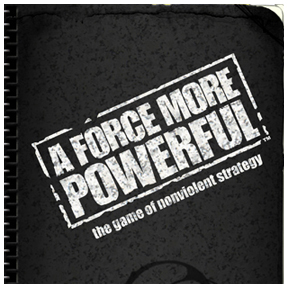-

-

-
- An Inconvenient Video Game
- Game designers could use their skills
to teach kids to save the world
- Monday,
July 10, 2006
- By Paul Loeb
-
- Someone should make a video game of
The Inconvenient Truth. The generation of most game-players will
inherit global warming's escalating march, and many won't see any
documentary, even an excellent one. Inconvenient Truth is, after
all, a lecture and slide show, mixed with a strong personal story,
some nice Matt Groening animation, and more humor and hope than
you'd expect from a film on the subject. We need to get everyone we
can into the theater seats, buying tickets for friends, colleagues,
and neighbors, paying the way for those on the fence to at least
give it a look. I'd love to see schools negotiate daytime matinees
in normally empty weekday theaters, so their students can attend at
radically discounted prices. But some -- especially those swayed by
the Bush administration's propaganda against science, thinking, and
other "reality-based" pursuits -- will still find it too much of a
high-brow lecture.
-
- Given that we need to reach more
people, how about an Inconvenient Video Game, a Sim World where
players learn about the issues surrounding global warming, choose
paths of action to address it, and link to real-world external
websites? The goal would be to navigate America (and help navigate
the planet) through what it will take to emerge without disaster.
Players could research the facts, make good or bad choices, and see
the consequences of various actions taken. The game could even
include some modeling of political advocacy, so players could take
the role of ordinary citizens, since our efforts will ultimately
decide whether America ever does really address one of the most
complex and urgent crises in human history.
-
- The game could build on Gore's
existing movie, slide show, and website, adapting whatever elements
were useful, but also making the process more interactive, more
engaging for an audience for whom games are a prime language. Why
not put people in the role of climate scientists assessing the
evidence, governmental and corporate decision makers, citizens
trying to keep our society from driving off a cliff? Why not let
them try out different ways of acting?
-
- There's actually one existing model
called A Force More Powerful: The Game of Nonviolent Strategy,
developed by The International Center on Nonviolent Conflict (ICNC)
(from their book and PBS documentary of the same name), along with
media firm York Zimmerman Inc. and game designers at BreakAway Ltd.
The game explores strategies and tactics used successfully in ten
historical nonviolent struggles to win freedom and secure human
rights against dictators, occupiers, colonizers, and corrupt
regimes. It's part simulation, part strategy game for scholars,
activists, and anyone interested in alternative paths to change. I'm
not a gamer, but I found it provocative and challenging. An
Inconvenient Video Game could draw on its lessons.
-
- I'd love to see a climate change
game distributed and promoted for free as an internet download. The
goal wouldn't be to make money -- it never was with the film. It
would be to draw in as many people as possible to grapple with the
threat we now face, taking advantage of every possible medium. And
by giving away the game online, and promoting it with viral
marketing, it would have a chance to reach the widest possible
audience.
-
- There's a danger, of course, that
all people will do is sit and watch. But that exists any time we're
sitting watching screens. If we wanted to get really creative, the
program could even ask repeat users to log on with whatever they'd
done that week to help address the issue. Our top game designers can
now create and destroy complex virtual worlds, entrancing us in
powerful ways. They could do the same to save the world we actually
inhabit.
|